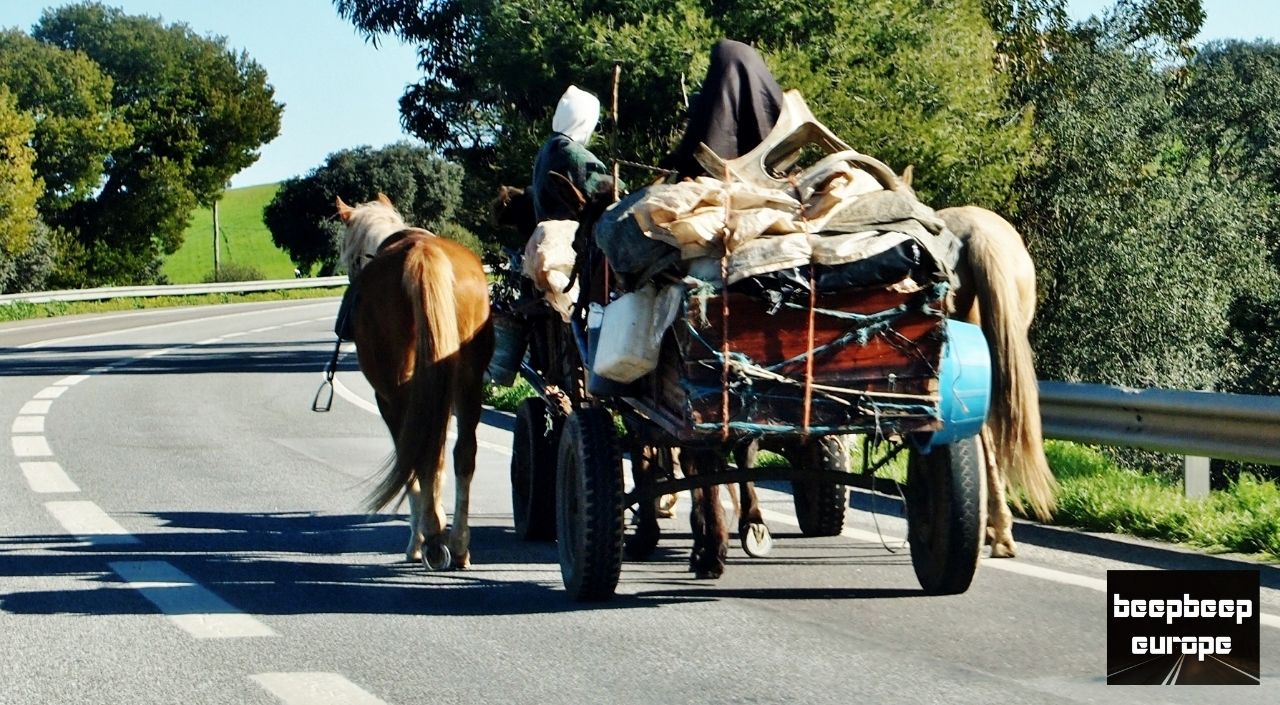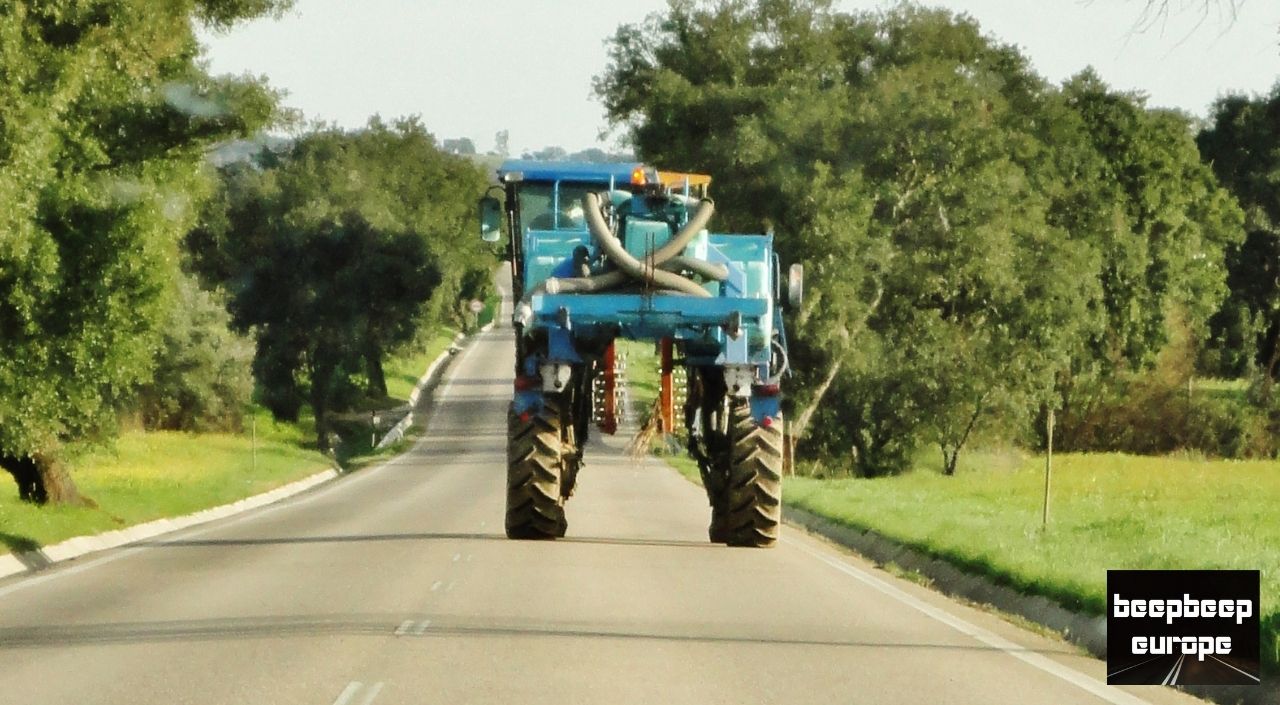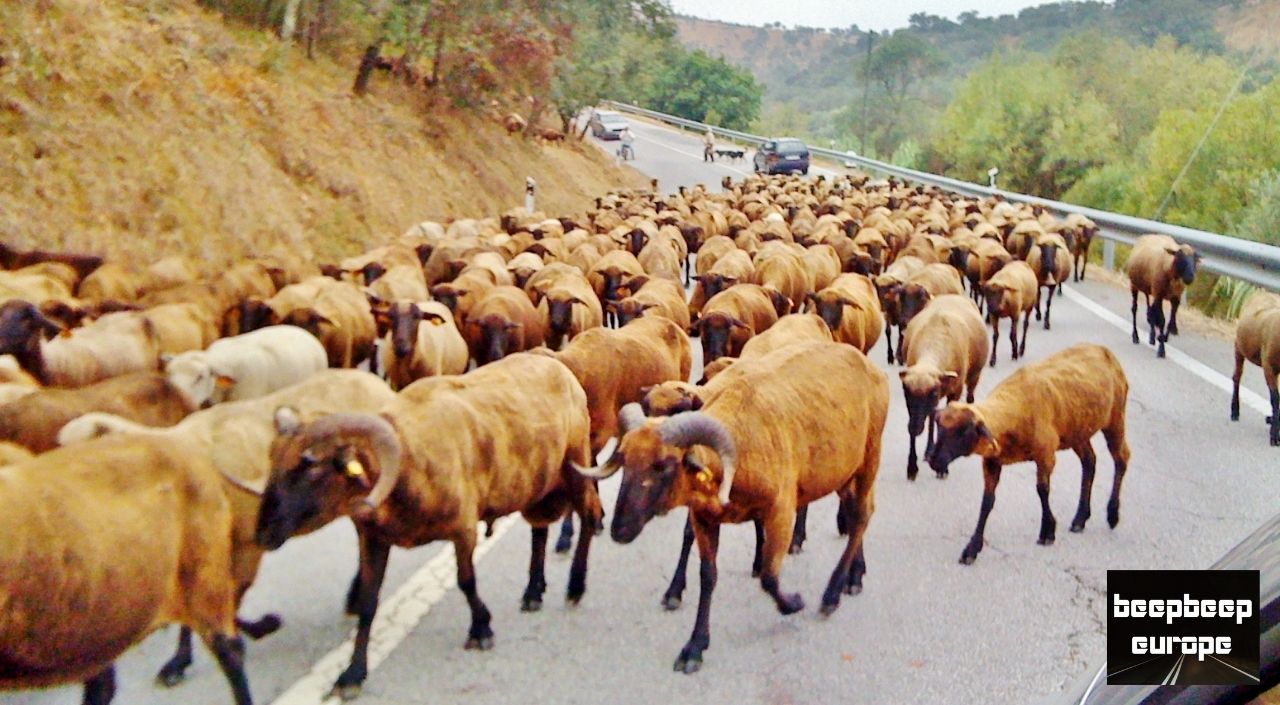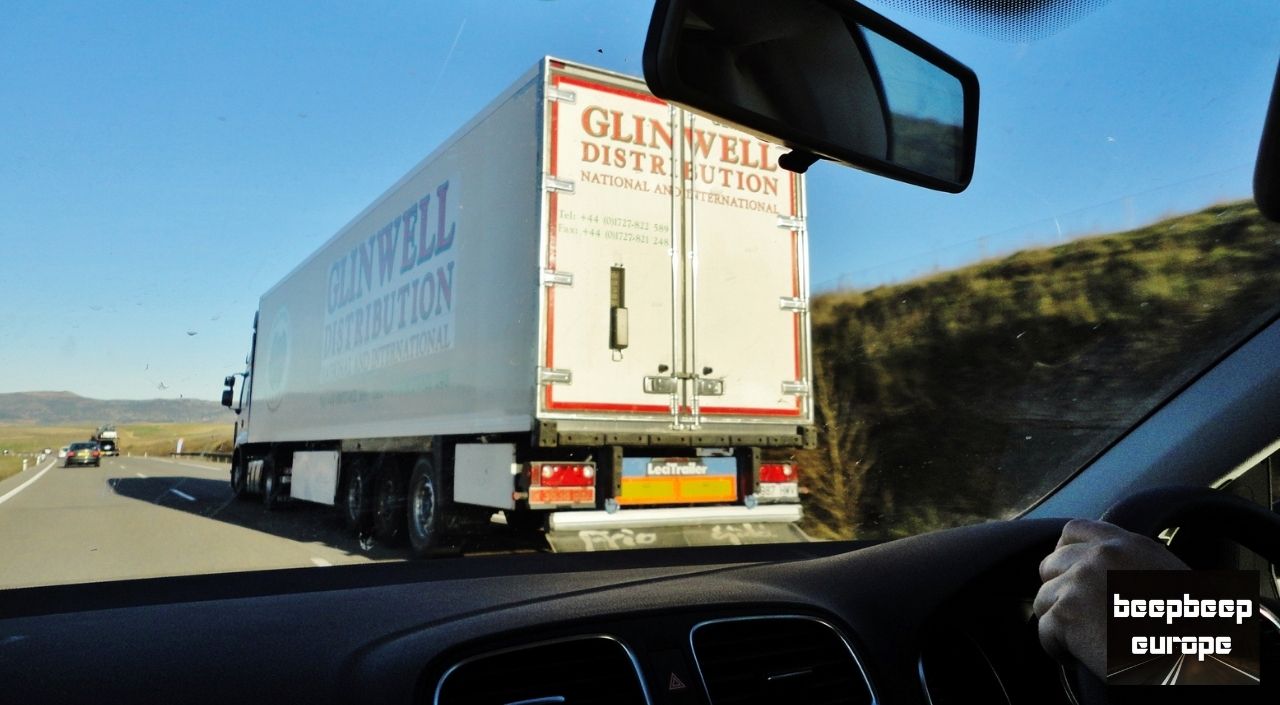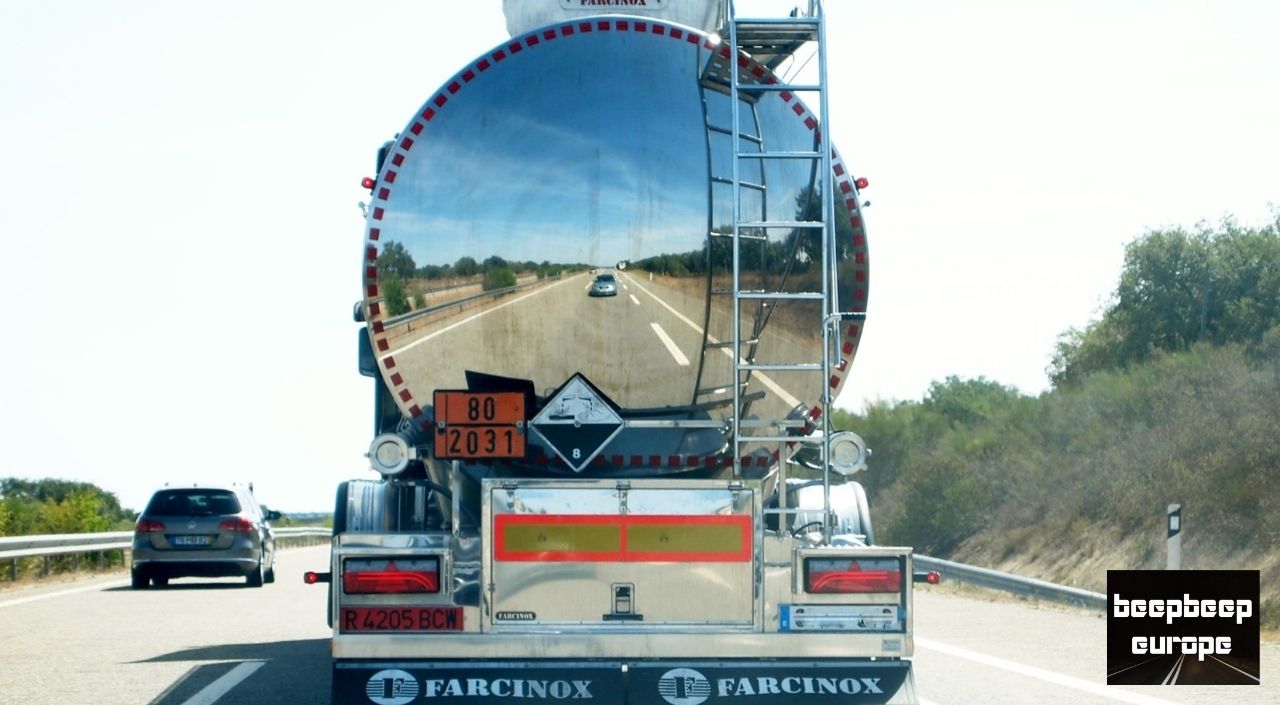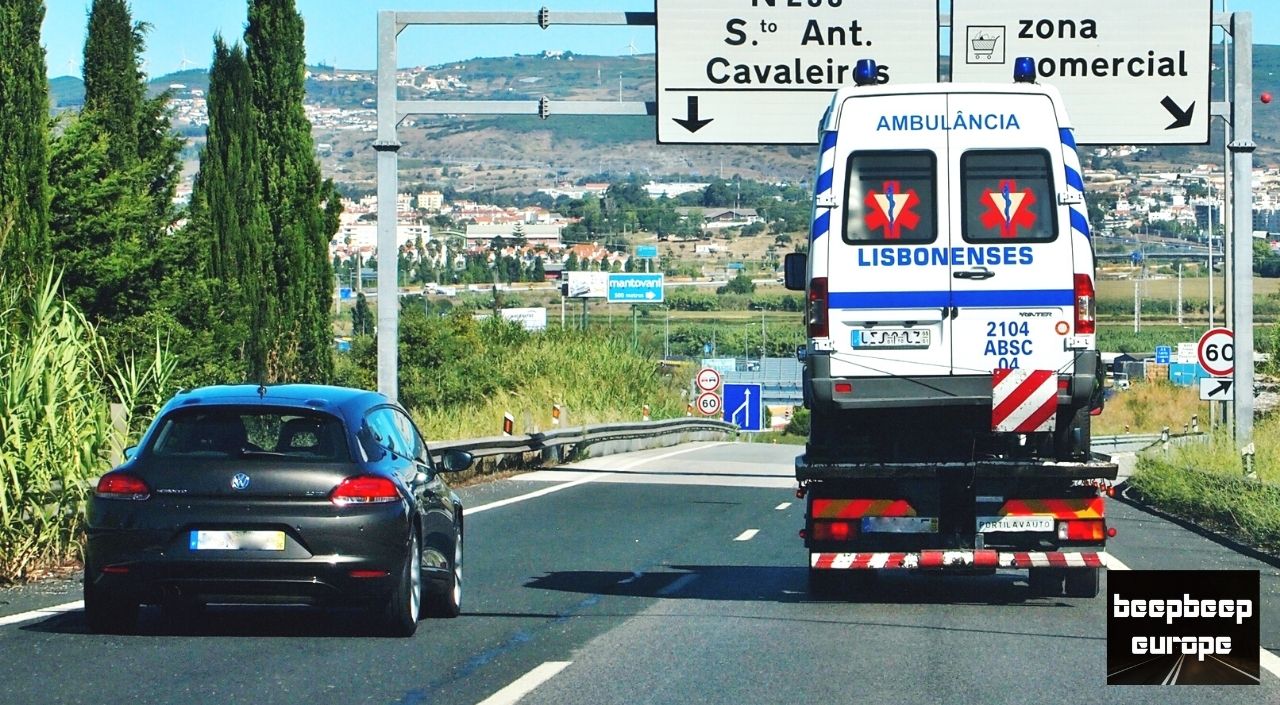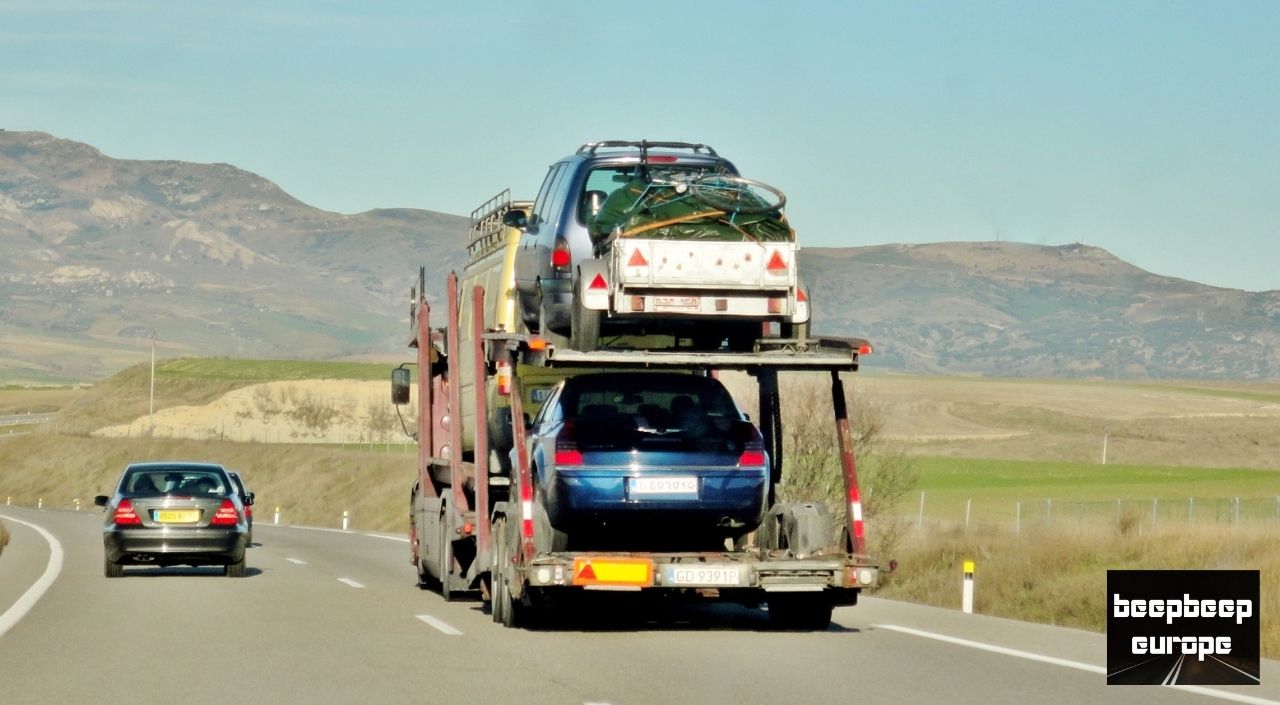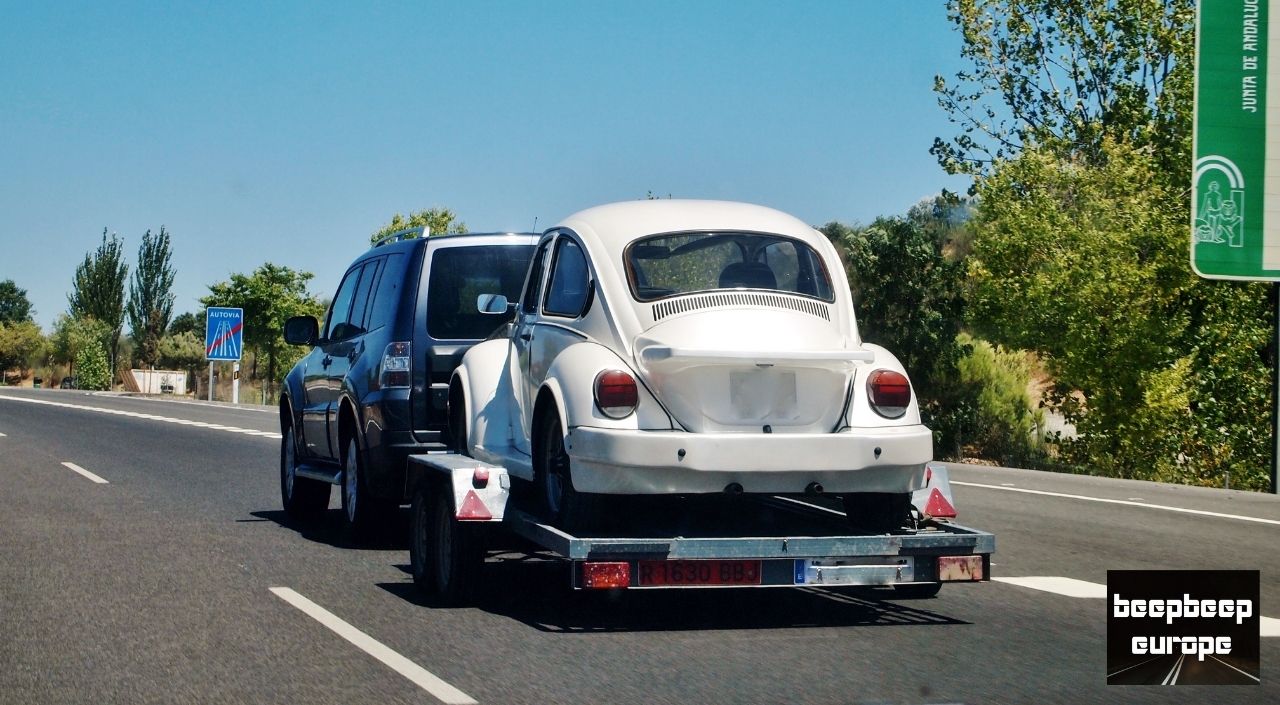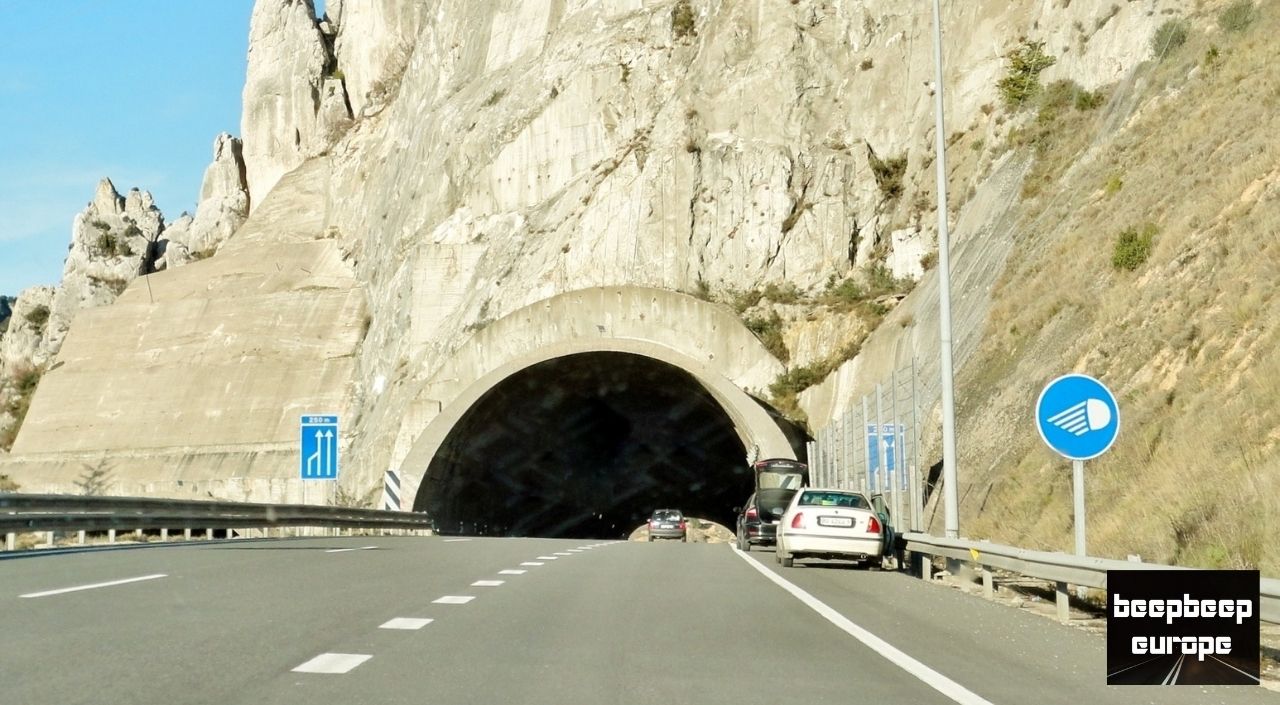Driving around Europe...
GENERAL INFO / REGULATIONS:
When driving through Europe you must be aware that each country has its own laws/regulations to adhere to - please check our other pages also as these include further information on each country. The following points cover Europe in general - hope these help with organising your trip and making it a safe one:
1. In the Continent you drive on the opposite side of the road to the UK. They drive on the right hand side and their steering wheels are on the left. They also overtake on the left rather than on the right. It's easy to forget which side you should be driving on when stopping off for petrol and food for instance, so take care.
2. You must carry photo ID with you everywhere as well all relevant driving documents whilst driving.
3. It is mandatory that all passengers wear seat belts where fitted, at all times. It is also compulsory to carry reflective safety vests inside your vehicle, within reach, for each passenger and must be put on before stepping out of the vehicle in emergencies.
4. Never drive under the influence of alcohol. Random breath tests may take place whilst on your travels.
5. It is highly recommended to stick to the speed limits, there are now many speed cameras dotted around Europe.
6. You may have to pay on the spot fines - if for example, you are caught parking illegally, over the speed limit or have made an illegal turn, etc.
7. You must display a GB sticker on the back of your vehicle if you do not have an Euro plate including the GB letters. (On the spot fines may be issued if you not comply.)
When driving through Europe you must be aware that each country has its own laws/regulations to adhere to - please check our other pages also as these include further information on each country. The following points cover Europe in general - hope these help with organising your trip and making it a safe one:
1. In the Continent you drive on the opposite side of the road to the UK. They drive on the right hand side and their steering wheels are on the left. They also overtake on the left rather than on the right. It's easy to forget which side you should be driving on when stopping off for petrol and food for instance, so take care.
2. You must carry photo ID with you everywhere as well all relevant driving documents whilst driving.
3. It is mandatory that all passengers wear seat belts where fitted, at all times. It is also compulsory to carry reflective safety vests inside your vehicle, within reach, for each passenger and must be put on before stepping out of the vehicle in emergencies.
4. Never drive under the influence of alcohol. Random breath tests may take place whilst on your travels.
5. It is highly recommended to stick to the speed limits, there are now many speed cameras dotted around Europe.
6. You may have to pay on the spot fines - if for example, you are caught parking illegally, over the speed limit or have made an illegal turn, etc.
7. You must display a GB sticker on the back of your vehicle if you do not have an Euro plate including the GB letters. (On the spot fines may be issued if you not comply.)
8. You will need to use Headlamp Beam Adaptor stickers when driving on the Continent so that you do not dazzle oncoming traffic. These may, however, not be suitable for all types of headlights, therefore, your headlamps need to be adjusted accordingly. You may require a garage to make this adjustment for you. Don't forget to remove/adjust these as soon as you return to the UK.
9. It is prohibited to use mobile phones whilst driving (calling/texting/emailing). A hands-free kit is recommended. Also, do not take pictures whilst driving.
10. Children under 12 years of age can only sit in the front seats if it is a 2 seater vehicle or if there are no seat belts in the back. (In France this applies to children aged 10 and under.)
11. Approved child seats must be used by children under 12 years of age or under 135cm in height. You need to deactivate the passenger airbags if using an approved rear-facing child seat in the front. (In France this applies to children aged 10 and under and child seat specifications are determined by weight (15kg) rather than height.)
12. It is mandatory to carry spare bulbs. (New cars which require a garage to change the bulbs - do not apply)
13. If you normally wear glasses/contact lenses you must carry a spare pair in your car.
14. It is recommended to carry a Travel Fire Extinguisher and a First Aid Kit.
9. It is prohibited to use mobile phones whilst driving (calling/texting/emailing). A hands-free kit is recommended. Also, do not take pictures whilst driving.
10. Children under 12 years of age can only sit in the front seats if it is a 2 seater vehicle or if there are no seat belts in the back. (In France this applies to children aged 10 and under.)
11. Approved child seats must be used by children under 12 years of age or under 135cm in height. You need to deactivate the passenger airbags if using an approved rear-facing child seat in the front. (In France this applies to children aged 10 and under and child seat specifications are determined by weight (15kg) rather than height.)
12. It is mandatory to carry spare bulbs. (New cars which require a garage to change the bulbs - do not apply)
13. If you normally wear glasses/contact lenses you must carry a spare pair in your car.
14. It is recommended to carry a Travel Fire Extinguisher and a First Aid Kit.
15. It is recommended to take a break from driving every couple of hours - stop in a safe place if you are feeling tired. Driving can be extremely exhausting especially when you are having to concentrate on unfamiliar territory.
16. Do remember to use the correct fuel as your Breakdown Cover may not cover the costs to rectify this. You'll need to pay attention when filling up on the Continent as it differs from the UK. Diesel is known as Gazole/Gasoleo and sometimes has a yellow nozzle rather than a black one. Fuel is available in different grades. It is forbidden to carry fuel in cans in cars.
17. If you are unsure about road markings: A continuous line means you cannot cross this line or overtake. If the lines are intermittent and there's a continuous line to the left of the intermittent lines this means you can overtake if it is safe to do so. If there are intermittent lines and a continuous line to the right of these, this means oncoming traffic can overtake if it is safe to do so.
18. Don't forget to negotiate roundabouts in the right direction (anti-clockwise) - you'd be surprised how easily you can forget which way to go.
19. Please be aware of bad signage. Road signs are not always clear and exit warnings may not be in place. Many signs are placed on the actual exits - so please slow down if you feel you are nearing your exit so as not to miss it.
20. Watch out for cyclists, horse & carriages, tractors, motorcycles, animals and pedestrians on country roads and in general. You will always be held responsible for damages if you harm a pedestrian/cyclist.
21. We recommend you carry maps in case your sat nav stops working or does not recognise the route. You should also input your route into your sat nav whilst stationary and not whilst driving as it can be distracting.
16. Do remember to use the correct fuel as your Breakdown Cover may not cover the costs to rectify this. You'll need to pay attention when filling up on the Continent as it differs from the UK. Diesel is known as Gazole/Gasoleo and sometimes has a yellow nozzle rather than a black one. Fuel is available in different grades. It is forbidden to carry fuel in cans in cars.
17. If you are unsure about road markings: A continuous line means you cannot cross this line or overtake. If the lines are intermittent and there's a continuous line to the left of the intermittent lines this means you can overtake if it is safe to do so. If there are intermittent lines and a continuous line to the right of these, this means oncoming traffic can overtake if it is safe to do so.
18. Don't forget to negotiate roundabouts in the right direction (anti-clockwise) - you'd be surprised how easily you can forget which way to go.
19. Please be aware of bad signage. Road signs are not always clear and exit warnings may not be in place. Many signs are placed on the actual exits - so please slow down if you feel you are nearing your exit so as not to miss it.
20. Watch out for cyclists, horse & carriages, tractors, motorcycles, animals and pedestrians on country roads and in general. You will always be held responsible for damages if you harm a pedestrian/cyclist.
21. We recommend you carry maps in case your sat nav stops working or does not recognise the route. You should also input your route into your sat nav whilst stationary and not whilst driving as it can be distracting.
22. Do not throw litter or cigarette butts out of your windows or leave your litter behind (cigarette butts can cause fires). Respect the roads, rest areas, countryside, beaches, etc. and leave them as you'd expect to find them - nice and clean!
23. Check your tyres, windscreen, mirrors, lights, oil and water throughout your travels and not just when you set off.
24. Do note that Bank Holidays differ from country to country so be aware of parking restrictions.
25. Do note there is more traffic on the roads during the summer months as everyone is either heading to their omeland for a break or the locals are heading to the coast.
26. If you are broken into you must report it to the Police and obtain a crime reference number to enable you to make an insurance claim.
27. During Winter months snow chains are compulsory in: Andorra, Austria, France, Germany, Italy, Norway, Sweden and Switzerland. Do check the country specifications before planning your trip as you will need to sort these out before departing. Signs will indicate what is required on approaching all mountain regions and/or road conditions will be an indication also (ice, heavy snow) - you'll need to act accordingly. If you fail to carry snow chains/winter tyres where required you are liable to be heavily fined. You will also be liable if you are involved in an accident. You should not use snow chains if the roads are clear of snow as this may damage not only the surface but your vehicle too.
28. Winter tyres are mandatory in some European countries and recommended in others. Do check the country specifications before planning your trip as you will need to sort these out before departing. If you fail to use winter tyres where required you are liable to be heavily fined. You will also be liable if you are involved in an accident.
29. And finally, most importantly (which should have been firstly) - make sure you have a good, long rest before you set off on your travels as it can be very tiring!
23. Check your tyres, windscreen, mirrors, lights, oil and water throughout your travels and not just when you set off.
24. Do note that Bank Holidays differ from country to country so be aware of parking restrictions.
25. Do note there is more traffic on the roads during the summer months as everyone is either heading to their omeland for a break or the locals are heading to the coast.
26. If you are broken into you must report it to the Police and obtain a crime reference number to enable you to make an insurance claim.
27. During Winter months snow chains are compulsory in: Andorra, Austria, France, Germany, Italy, Norway, Sweden and Switzerland. Do check the country specifications before planning your trip as you will need to sort these out before departing. Signs will indicate what is required on approaching all mountain regions and/or road conditions will be an indication also (ice, heavy snow) - you'll need to act accordingly. If you fail to carry snow chains/winter tyres where required you are liable to be heavily fined. You will also be liable if you are involved in an accident. You should not use snow chains if the roads are clear of snow as this may damage not only the surface but your vehicle too.
28. Winter tyres are mandatory in some European countries and recommended in others. Do check the country specifications before planning your trip as you will need to sort these out before departing. If you fail to use winter tyres where required you are liable to be heavily fined. You will also be liable if you are involved in an accident.
29. And finally, most importantly (which should have been firstly) - make sure you have a good, long rest before you set off on your travels as it can be very tiring!
MOTORWAYS:
1. The majority of toll ticket booths are situated on the left, so if you have a right hand drive (UK) car, your passenger will need to collect/pay the tickets or you will need to get out or climb across if travelling alone. Some places have now installed ticket booths on both sides but they are very rare. You will also see higher placed ticket booths for truck drivers - these come in handy when your ticket booth isn't working, you can take a ticket from the one above instead. Also note, not all ticket booths are the same. Some are manual, some automatic. Some accept bankcards - some cash only and some only take the exact amount. Some have operators, some don't. So do look out for the signs on approaching the toll booths as you (and all the cars behind you) will have to reverse out if you do not spot which one you require sooner.
2. Motorways can be payable by cash/bankcards at toll booths, clearly marked just before exits. You must collect a ticket from a toll booth on entering the motorways - do put them in a safe place as you will have to pay the full/top price if you lose them. Remember to take plenty of loose change/cash with you to cover the toll costs if you do not wish to use your bankcards.
3. You can be fined for running out of petrol on motorways/dual carriageways. Do keep an eye on your petrol gauge and fill up when it reaches a quarter of a tank mark. Never leave it to go into reserve as you may not find an opened petrol station in time.
4. Do not park in rest areas which are allocated to trucks/heavy goods vehicles (HGVs).
5. Never park behind a truck/HGVs. Truck drivers are sometimes unaware that there is a car parked behind them and reverse without knowing. Cars have been completely demolished and unfortunately there have been a number of fatalities because of this.
6. Do take care and slow right down when entering slip roads and petrol stations. When you've been on the road for a while it's easy to forget how fast you're going.
7. Don't forget to switch your lights on when entering tunnels, even during the day.
8. The majority of motorways on the Continent now have service stations which include: Petrol stations, Cafetarias/Coffee shops, Toilets, Telephones and Cash machines. Some even have Restaurants, Shops and Motels nearby.
1. The majority of toll ticket booths are situated on the left, so if you have a right hand drive (UK) car, your passenger will need to collect/pay the tickets or you will need to get out or climb across if travelling alone. Some places have now installed ticket booths on both sides but they are very rare. You will also see higher placed ticket booths for truck drivers - these come in handy when your ticket booth isn't working, you can take a ticket from the one above instead. Also note, not all ticket booths are the same. Some are manual, some automatic. Some accept bankcards - some cash only and some only take the exact amount. Some have operators, some don't. So do look out for the signs on approaching the toll booths as you (and all the cars behind you) will have to reverse out if you do not spot which one you require sooner.
2. Motorways can be payable by cash/bankcards at toll booths, clearly marked just before exits. You must collect a ticket from a toll booth on entering the motorways - do put them in a safe place as you will have to pay the full/top price if you lose them. Remember to take plenty of loose change/cash with you to cover the toll costs if you do not wish to use your bankcards.
3. You can be fined for running out of petrol on motorways/dual carriageways. Do keep an eye on your petrol gauge and fill up when it reaches a quarter of a tank mark. Never leave it to go into reserve as you may not find an opened petrol station in time.
4. Do not park in rest areas which are allocated to trucks/heavy goods vehicles (HGVs).
5. Never park behind a truck/HGVs. Truck drivers are sometimes unaware that there is a car parked behind them and reverse without knowing. Cars have been completely demolished and unfortunately there have been a number of fatalities because of this.
6. Do take care and slow right down when entering slip roads and petrol stations. When you've been on the road for a while it's easy to forget how fast you're going.
7. Don't forget to switch your lights on when entering tunnels, even during the day.
8. The majority of motorways on the Continent now have service stations which include: Petrol stations, Cafetarias/Coffee shops, Toilets, Telephones and Cash machines. Some even have Restaurants, Shops and Motels nearby.
Accident/Breakdowns on Motorways/Dual Carriageways...
We highly recommend you take out a European Breakdown policy for peace of mind - there's nothing worse than having an accident, breaking down and needing roadside assistance, being broken into, needing emergency accommodation or even repatriation and not being covered - the recovery costs will be very high and it really isn't worth taking the risk to initially save yourself a few pounds.
Make sure you take out the correct policy to suit your needs. You can choose a Single trip policy for a short holiday/weekend break or a Multi-trip policy if your trip is longer. For your provider to protect you completely you will need to hold the following: Valid Motor Insurance, Full valid Driving Licence, Vehicle Registration Document (V5). Plus your vehicle must be in a roadworthy condition.
You may have to pay towing and repair (labour) costs upfront so prepare to have these funds available. Your policy may also not cover you for everything as certain items may be in excess of your breakdown cover limits - do plan for the extra funds, just in case. Please note, you will have to pay the cost of parts/garage labour charges as these are not covered. Do check your policy thoroughly for items you are covered/not covered for. Do remember to keep all the original receipts/police reports in order to make a claim and be reimbursed on your return to the UK.
Make sure you take out the correct policy to suit your needs. You can choose a Single trip policy for a short holiday/weekend break or a Multi-trip policy if your trip is longer. For your provider to protect you completely you will need to hold the following: Valid Motor Insurance, Full valid Driving Licence, Vehicle Registration Document (V5). Plus your vehicle must be in a roadworthy condition.
You may have to pay towing and repair (labour) costs upfront so prepare to have these funds available. Your policy may also not cover you for everything as certain items may be in excess of your breakdown cover limits - do plan for the extra funds, just in case. Please note, you will have to pay the cost of parts/garage labour charges as these are not covered. Do check your policy thoroughly for items you are covered/not covered for. Do remember to keep all the original receipts/police reports in order to make a claim and be reimbursed on your return to the UK.
Here are a few simple steps to follow if you are unfortunate enough to be involved in an accident whilst driving on the Continent:
1. Park up safely on the hard shoulder/roadside/safe spot off the road if possible. If not, put on your hazard warning lights and exit when it is safe to do so.
2. It is compulsory to carry reflective safety vests inside your vehicle for each passenger. You must put these on before stepping out of the vehicle.
3. All passengers should exit the car using the doors nearest to the kerb - then lock the car.
4. On motorways it is mandatory to leave your vehicle and climb over the barriers if you are involved in an accident - never leave passengers inside the car!
5. Give aid to anyone in need of assistance.
6. Use the roadside Emergency Telephones to call for assistance, located approx. every 2 kms, which will connect you to the local Police or call the Emergency Services from your mobile on 112. Do note, if you use your mobile you will be charged any outbound/inbound international calls by your service provider - these can be expensive.
7. It is mandatory to carry a red warning triangle at all times. Place the triangle 30 metres (100 ft) on the road behind your vehicle to alert approaching traffic to the dangers/hazards up ahead and to allow them enough time to switch lanes.
8. Obtain the other party's full details as well as the details of any witnesses.
9. Remember to take photographs of the damage to all vehicles.
10. The Recovery Vehicle will either assist you at the roadside or will take your vehicle to a local garage where you can make the necessary repair arrangements.
11. If your car is unrepairable, alternative arrangements will have to be made. Eg. car hire.
12. Contact your Motor Insurance provider to discuss accident/arrangements.
Here are a few simple steps to follow if you are unfortunate enough to breakdown whilst driving on the Continent:
1. Park up safely on the hard shoulder/roadside/safe spot off the road if possible. If not, put on your hazard warning lights and exit when it is safe to do so.
2. It is compulsory to carry reflective safety vests inside your vehicle for each passenger. You must put these on before stepping out of the vehicle.
3. All passengers should exit the car using the doors nearest to the kerb - then lock the car.
4. On motorways it is mandatory to leave your vehicle and climb over the barriers if your car has broken down - never leave passengers inside the car!
5. Use the roadside Emergency Telephones to call for assistance, located approx. every 2 kms, which will connect you to the local Police or call the Emergency Services from your mobile on 112. They will send you a breakdown recovery vehicle. Do note, if you use your mobile you will be charged any outbound/inbound international calls by your service provider - these can be expensive.
6. It is mandatory to carry a red warning triangle at all times. Place the triangle 30 metres (100 ft) on the road behind your vehicle to alert approaching traffic to the dangers/hazards up ahead and to allow them enough time to switch lanes.
7. The Recovery Vehicle will either assist you at the roadside or will take your vehicle to a local garage where you can make the necessary repair arrangements.
8. If your car is unrepairable, alternative arrangements will have to be made. Eg. car hire.
9. Contact your Breakdown Recovery Service provider to discuss breakdown/arrangements.
1. Park up safely on the hard shoulder/roadside/safe spot off the road if possible. If not, put on your hazard warning lights and exit when it is safe to do so.
2. It is compulsory to carry reflective safety vests inside your vehicle for each passenger. You must put these on before stepping out of the vehicle.
3. All passengers should exit the car using the doors nearest to the kerb - then lock the car.
4. On motorways it is mandatory to leave your vehicle and climb over the barriers if your car has broken down - never leave passengers inside the car!
5. Use the roadside Emergency Telephones to call for assistance, located approx. every 2 kms, which will connect you to the local Police or call the Emergency Services from your mobile on 112. They will send you a breakdown recovery vehicle. Do note, if you use your mobile you will be charged any outbound/inbound international calls by your service provider - these can be expensive.
6. It is mandatory to carry a red warning triangle at all times. Place the triangle 30 metres (100 ft) on the road behind your vehicle to alert approaching traffic to the dangers/hazards up ahead and to allow them enough time to switch lanes.
7. The Recovery Vehicle will either assist you at the roadside or will take your vehicle to a local garage where you can make the necessary repair arrangements.
8. If your car is unrepairable, alternative arrangements will have to be made. Eg. car hire.
9. Contact your Breakdown Recovery Service provider to discuss breakdown/arrangements.
Here are a few simple steps to follow if you need to change a flat tyre whilst driving on the Continent:
1. Don't! It is advisable to call for help instead. It can be seriously dangerous changing a tyre on the open roads/motorways - especially on the inside.
2. If you do decide to change a tyre, it is advisable not to change it on the hard shoulder or roadside. You should turn off and move well away from traffic.
3. Never change a tyre with passengers in the car.
4. Do not change a tyre on uneven, soft ground.
5. Never work under a car if you are using a jack.
6. Make sure you use your jack in the correct place to avoid damaging/collapsing the car.
Please note: You are only permitted to park up on the hard shoulder/roadside in Emergencies and never for a 'call of nature'.
1. Don't! It is advisable to call for help instead. It can be seriously dangerous changing a tyre on the open roads/motorways - especially on the inside.
2. If you do decide to change a tyre, it is advisable not to change it on the hard shoulder or roadside. You should turn off and move well away from traffic.
3. Never change a tyre with passengers in the car.
4. Do not change a tyre on uneven, soft ground.
5. Never work under a car if you are using a jack.
6. Make sure you use your jack in the correct place to avoid damaging/collapsing the car.
Please note: You are only permitted to park up on the hard shoulder/roadside in Emergencies and never for a 'call of nature'.
Check out more tips below
Photography: beepbeepeurope
© Copyright. All rights reserved.
© Copyright. All rights reserved.
